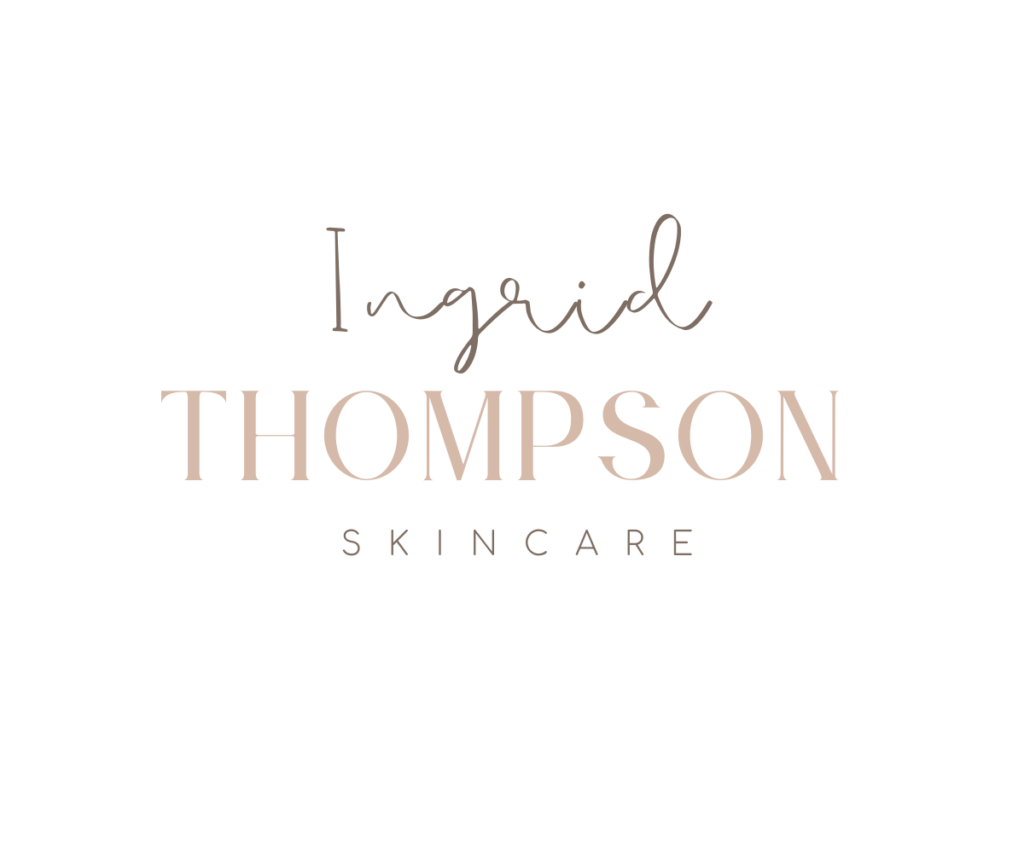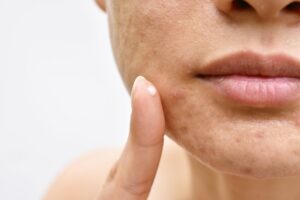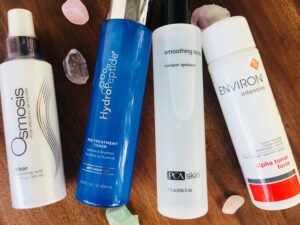Did you know that the pH of your skin can determine how healthy, glowing and vibrant it is? That’s because the skin’s pH plays a key role in maintaining a healthy and strong lipid barrier and providing a thriving environment for your skin’s microbiome and immune system. The integrity of our lipid barrier is one of the main factors in maintaining healthy, high vibrational skin. If our skin immunity is constantly being activated, our ability to create new and healthy cells becomes impaired resulting in skin issues and premature aging.
For health and wellness, we are encouraged to keep our bodies alkaline to avoid chronic inflammatory conditions and disease. However, when it comes to our skin, alkaline is not it’s optimal state. In fact, healthy skin should have a pH of around 4.5 – 5.5. A neutral pH is 7; so anything below that is considered an acidic environment and anything above it is termed alkaline.
When dealing with skincare, you’ve probably heard the term, pH balanced . That’s because when it comes to your skin’s pH, balance truly is key. Certain pathogenic bacteria grow best under alkaline conditions so the acidic nature of our skin helps healthy bacteria thrive while also providing antimicrobial protection. While an overly alkaline environment for your skin’s surface would disrupt the bacteria that live there and make you susceptible to opportunistic organisms, a highly acidic environment can also have undesired consequences like dehydration and inflammation. Your skin cells and friendly microbiota work together to keep your pH in an optimal range.
Our skin provides a protective shield from harmful pathogens and environmental toxins but is also a living, breathing, massive ecosystem, home to billions of organisms including bacteria, virus, fungi and even mites. Some of these organisms are beneficial bacteria and play a very important role in maintaining a healthy skin barrier.
Just like our gut flora uses chemical signals to communicate with our intestinal immune system, our skin’s immune system is in constant contact with the bacteria living there being informed, activated and deactivated for protection purposes.
Your skin’s microbiome is considered a “lipidome” where organisms thrive in a fatty or lipid rich environment, whereas your beneficial gut flora prefer fiber rich food sources.
Depending on whether you were born vaginally or C-section, you were exposed to a variety of bacteria that colonized both your gut and your skin. Every one of us has a unique and vastly diverse population of organisms that fluctuate throughout our entire life. This is one of the reasons why we can experience different skin issues during different ages. We can experience acne as a teenager, rashes in our 30’s and dry skin in our 50’s.
Now that you understand the crucial role pH plays in our skin health, how do we make sure that our pH stays within the optimal range to help beneficial bacteria flourish and protect our skin from environmental stressors?
What can cause disruption in our pH?
Certain foaming cleansers, highly astringent daily toners, and even normal tap water, influences the skin surface. The extreme increase or decrease of the skin pH irritates and breaks down the lipid barrier, disrupts your skin microbiome making you susceptible to dehydration, dryness, bacterial infections, premature aging and even skin cancer.
Other factors contributing to an imbalanced pH:
Excessive washing with harsh cleansers or scrubbing vigorously can strip away the natural oils and disrupt this balance. This can lead to a range of skin issues such as dryness, flakiness, and increased sensitivity.
Dermaplaning, a popular exfoliation technique, has gained attention for its ability to restore a youthful glow to the skin. However, it is important to understand that dermaplaning can disrupt the pH balance of the skin. This procedure involves the use of a sterile surgical blade to remove the outermost layer of dead skin cells, along with fine facial hair. While the process leaves the skin feeling smooth and radiant, it also strips away the protective layer of the skin, damaging the acid mantle. Consequently, the disturbance in pH caused by dermaplaning can leave the skin vulnerable and more susceptible to irritation and potential complications. It is essential to follow up dermaplaning with a suitable skincare routine that includes pH-balancing products, allowing the skin to recover and restore its natural equilibrium.
Sun exposure, while enjoyable and beneficial in moderation, can have a profound impact on the delicate balance of our skin’s pH levels. The ultraviolet (UV) rays emitted by the sun can strip the skin of its natural oils and moisture, leading to dryness and dehydration. This disruption of the skin’s pH balance can result in a range of issues, including increased sensitivity, redness, and even breakouts. Additionally, prolonged sun exposure can also lead to the overproduction of sebum, creating an imbalance that can trigger acne flare-ups. To maintain healthy and radiant skin, it is crucial to protect your skin from excessive sun exposure and nurture your skin’s pH balance with proper hydration and sunscreen as part of your skincare routine.
Not using a daily moisturizer can disrupt the delicate pH balance of your skin. When the skin lacks moisture, it becomes drier and more prone to irritation and inflammation. Since dry skin is more alkaline by nature, by incorporating a moisturizer into your skincare routine, you ensure that your skin stays well-hydrated and nourished, minimizing water loss, and helping to maintain an optimal pH level.
Chemicals like phthalates, parabens, petroleum, and harsh preservatives can disrupt the pH balance of our skin, leading to various unwanted effects. Phthalates, commonly found in fragrances, can interfere with hormonal regulation and cause skin irritation. Parabens, used as preservatives in many skincare products, can disrupt the endocrine system and potentially contribute to skin inflammation. Petroleum-based ingredients can form a film on the skin, clogging pores and hindering the skin’s natural ability to breathe and repair itself. Harsh preservatives, such as formaldehyde-releasing agents, can cause allergic reactions and compromise the skin’s barrier function. Maintaining a balanced pH is vital for the optimal functioning of the skin and its protective acid mantle. Therefore, it is essential to choose skincare products that are free from these detrimental chemicals to ensure our skin’s health and well-being.troleum, harsh preservatives
Leaky gut and unbalanced skin have a fascinating interconnectedness. Leaky gut syndrome refers to a condition in which the lining of the gut becomes compromised, allowing toxins, undigested food particles, and bacteria to leak into the bloodstream. This, in turn, triggers inflammation throughout the body, including the skin. As inflammation levels rise, the skin’s natural barrier function may become impaired, leading to increased sensitivity, dryness, and a compromised ability to heal. Moreover, when the gut’s microbial balance is disrupted due to leaky gut, it can contribute to dysbiosis, an imbalance of bacteria in the gut. This dysbiosis can further exacerbate skin conditions such as acne, eczema, and rosacea. Thus, nurturing a healthy gut by following a gut-healing diet, managing stress levels, and incorporating probiotics can significantly impact the balance and radiance of our skin.
An inflammatory diet can have a significant impact on the pH of the skin. When we consume foods high in sugar, processed oils, refined grains, and artificial additives, it can lead to inflammation in the body. This inflammatory response triggers an increase in the release of pro-inflammatory compounds, which can disrupt the skin’s pH balance. The skin’s natural pH is slightly acidic, around 5.5, creating an optimal environment for healthy skin function. However, an inflammatory diet can cause the skin’s pH to become more alkaline, which compromises its protective barrier. This shift can disrupt the skin’s ability to retain moisture, making it more susceptible to dryness, sensitivity, and various skin concerns. It is crucial to prioritize a diet rich in fresh fruits and vegetables, whole grains, lean proteins, and healthy fats to maintain the skin’s optimal pH balance and promote overall skin health.
Avoiding these factors that alter skin pH, eating a nutrient rich diet, selecting products that preserve the lipid barrier are all ways you can positively affect your skin health and continue to cultivate skin that thrives!!





